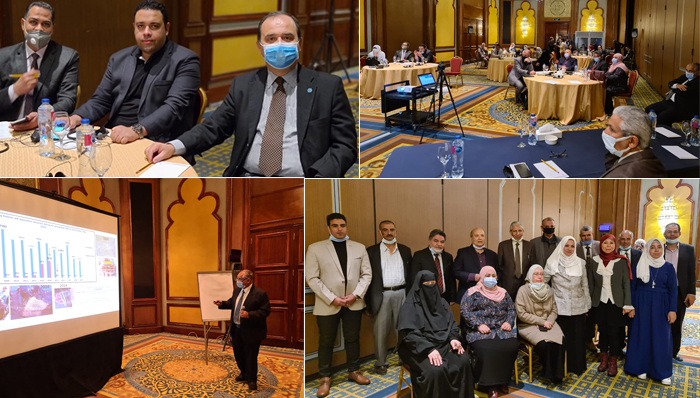Launching the Enhancing biosecurity governance project to support sustainable aquaculture production in Egypt

Cairo, Egypt - The Food and Agriculture Organization of the United Nations (FAO), in cooperation with the Public Authority for Fish Resources Development, has launched a project to enhance biosecurity governance to support sustainable aquaculture production in Egypt, which aims to support Egypt in the sustainable development of aquaculture, through a national aquatic animal health strategy that was developed within The Progressive Management Pathway to Improve Biosecurity for Aquaculture.
This project will contribute in improving food security by adapting and implementing effective biosecurity management to develop the aquaculture sector in a sustainable and healthy manner.
This project comes within the framework of the National Action Program signed between the Egyptian government and the FAO until the end of 2021, which is among its priorities: Improving agricultural productivity by enhancing surveillance, control and early warning of transboundary animal diseases, zoonotic diseases, plant pests and fish diseases.
During the preparatory workshop for the project, Nasredin Hag El-Amin, FAO representative in Egypt said: “With the increasing demand for fish as a result of the increasing populations and the awareness raising of the importance of fish as a source of high nutritional animal protein, in addition to its low price compared to other sources of animal protein, Biosecurity has become an essential concept to prevent, control and fight against the spread of infectious diseases in aquatic organisms, and it must be included in government regulations as well as in plans for agricultural operations.
He added: "It is necessary to work on building local capabilities, and increasing awareness and knowledge about preventive measures from diseases, which are basic and proactive procedures to maintain and develop this industry. Therefore, it must be supported through governance; through partnership between government, producers, academia, laboratories and technical networks and implementation/Application of preventive measures such as surveillance and vaccinations; Innovation through public-private partnerships in research, risk reduction techniques and rapid diagnostics.
Establishing an advanced reference laboratory for the analysis of fish, water, soil and feeds.
The project aims to identify the needs of the laboratories under the Ministry of Agriculture and the Public Authority for Fish Resources and contribute in the establishment of an advanced reference laboratory that includes the best advanced laboratory equipment specialized in analyzing fish, water, soil and feed in line with the requirements of the global market.
For his part, Dr. Salah Moselhi, President of the Public Authority for Fish Resources Development, said: “The authority pays special attention to the safety of the Egyptian fish product and enhancing the implementation of biosecurity system in fish farms and also, The project that we’re working on today with the FAO, will help us face many challenges and obstacles that need a lot of support to enhance production according to ambitious plans and projects that rely on modern systems in order to evaluate, monitor and set policies and strategies related to the quality of the Egyptian fish product”.
He added: "The use of good practices and the implementation of the biosecurity system is necessary to improve the economic and marketing value of the Egyptian fish product. Especially, after the European Union adoption of a regulation recognizing not to import farmed fish from farms that do not apply quality control and control systems at all stages of production”.
Experts and specialists attended the founding workshop from the FAO and the Public Authority for Fish Resources Development, academics from Egyptian universities, researchers from research and scientific centers, in addition to experts from World Fish.

According to the statistics issued by the Public Authority for Fish Resources Development, the production of the fishery sector in Egypt in 2020 reached two million tons of fish from farms and fisheries, which put Egypt in an advanced position globally and regionally, as Egypt ranks first at the African level, It is ranked sixth in the world in production from aquaculture, after it was ranked eighth among the 15 largest fish producing countries from aquaculture, according to the FAO statistics in 2014.
The Food and Agriculture organization (FAO) and its partners strive for aquaculture stakeholders in the public and private sectors to engage in a fruitful partnership in order to enhance biosecurity management in aquaculture, and jointly develop and adopt a national aquaculture management strategy within the Progressive Management Process for Improving Biosecurity for Aquaculture PMP/AB. The Progressive Management Track is one of FAO's tools through which management capacity is built. It consists of four phases aimed at developing a sustainable and resilient national aquaculture system and creating a national aquaculture health strategy. It is the overall biosecurity governance framework that will be applied in this project.
The results of this project are expected to contribute in enhancing the capacities of the competent authorities, farmers and relevant stakeholders, to support responsible and sustainable production of aquaculture and reduce risks. This will be achieved by improving human resource capabilities and raising awareness regarding biosecurity management at the policy and farm level. Also by developing and enhancing proper practices in aquaculture and biosecurity.
